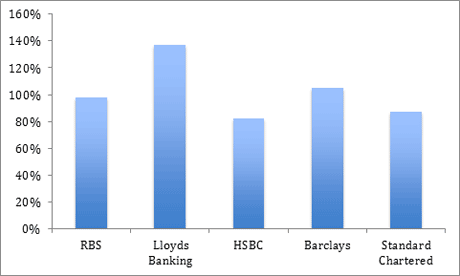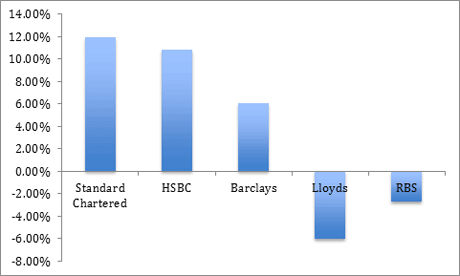If you must buy a bank, this is the one to buy
Banks don't make particularly attractive investments at the moment. But if you must buy one, says Phil Oakley - then one bank stands out from the rest.
Get the latest financial news, insights and expert analysis from our award-winning MoneyWeek team, to help you understand what really matters when it comes to your finances.
You are now subscribed
Your newsletter sign-up was successful
Want to add more newsletters?

Twice daily
MoneyWeek
Get the latest financial news, insights and expert analysis from our award-winning MoneyWeek team, to help you understand what really matters when it comes to your finances.

Four times a week
Look After My Bills
Sign up to our free money-saving newsletter, filled with the latest news and expert advice to help you find the best tips and deals for managing your bills. Start saving today!
As you might have noticed, we're not keen on banks.
The trouble is, you don't really know what you are buying. Banks' balance sheets are very complex things. It is virtually impossible to work out what they own and what they owe.
Throw in the fact that most are highly leveraged plays on national economies, and avoiding UK and European banks looks like common sense.
MoneyWeek
Subscribe to MoneyWeek today and get your first six magazine issues absolutely FREE

Sign up to Money Morning
Don't miss the latest investment and personal finances news, market analysis, plus money-saving tips with our free twice-daily newsletter
Don't miss the latest investment and personal finances news, market analysis, plus money-saving tips with our free twice-daily newsletter
If you accept this simplistic analysis, but want to take the plunge into the sector anyway, then last week has reinforced what a lot of us already know: Standard Chartered and HSBC are the only UK-quoted banks worth even considering investing in.
The best returns with the lowest financial risk
During the last few weeks, I have gone on about the fact that using lots of borrowed money is the main driver of the returns banks earn for shareholders.
This is true for both Standard Chartered and HSBC. But the way they are financed is very commendable compared with their peers.
UK banks: loan-to-deposit ratios

Both Standard Chartered and HSBC comfortably finance their loans with deposits (see chart above a figure of below 100% means that customer deposits outweigh loans) and don't rely on wholesale finance. This makes their businesses less risky.
As you can see in the chart below, they also earn higher returns on equity than their UK peers with less leverage. In short, both banks look better placed than most to operate with tougher capital requirements. They are also exposed to faster-growing economies.
UK banks: 2011 return on equity

Standard Chartered remains the quality play
Of the two, we'd say that Standard Chartered is clearly the most impressive bank. Three quarters of its profits come from Asia, where the growth prospects - and therefore prospects for loan growth - are most promising. While Korean and Indian profits need to be addressed, profits in China, Singapore and Indonesia are growing strongly.
One of the great advantages of operating in Asia is the region's strong savings culture. This means that banks have a ready supply of finance that gives them a competitive advantage over more leveraged players.
The way Standard Chartered conducts itself is very impressive. One striking example of this is its control of costs. Unlike so many banks that seem to be paying a bigger proportion of profits to their workers, Standard Chartered's costs grew broadly in line with income in 2011. Despite growing pre-tax profits by 10.7% in 2011, the staff bonus pool was unchanged.
Also of note is the fact thatthe company paid out more to its shareholders in dividends than it did to its workers in bonuses other banks would do well to follow this example.
Standard Chartered is in good shape. For 2012, it is projecting double-digit growth in earnings per share on the back of strong income growth and tight cost control. In the medium term, it is targeting a mid-teens return on equity.
MoneyWeek videos

What is a balance sheet?
What a balance sheet is for, the type of information it contains, and how you can use it.
Watch all of Tim's videos here
Of course, quality rarely comes cheap, and Standard Chartered is no exception. The bank trades at a 40% premium to its book value and offers a prospective dividend yield of 3%. This suggests that a lot of its growth prospects are already in the share price.
Is HSBC better value?
Like Standard Chartered, HSBC has a high exposure to faster-growing emerging markets. However, it faces a few more problems. Most notable is its struggle to contain its costs.
Its cost-to-income ratio (how much its spends to earn $1 of income) increased to 57.5% from 55.2% in 2011. It has a long-term target of 48-52% but getting there looks challenging, as it is having to pay Asian bankers more money.
We like HSBC's retail and commercial banking units, but the heady days of investment banking are over, and this could hold back profits in the years ahead.
However, HSBC is much cheaper than Standard Chartered. It still trades below its book value (0.96 times based on 2012 forecasts) and yields nearly 5%. The bank grew its dividend by 14% in 2011 and is expected to increase it again by 8.5% in 2012. This looks quite appealing.
On balance, given the difference in valuations, we'd favour HSBC. However, the big thing to remember with both banks is that for them to thrive, Asian economies must remain strong. If Asia comes a cropper which is quite possible if China suffers a hard landing - then, while their leverage is lower than their UK peers', it still won't do shareholders any favours in a weak economy.
Get the latest financial news, insights and expert analysis from our award-winning MoneyWeek team, to help you understand what really matters when it comes to your finances.
Phil spent 13 years as an investment analyst for both stockbroking and fund management companies.
-
 Should you buy an active ETF?
Should you buy an active ETF?ETFs are often mischaracterised as passive products, but they can be a convenient way to add active management to your portfolio
-
 Power up your pension before 5 April – easy ways to save before the tax year end
Power up your pension before 5 April – easy ways to save before the tax year endWith the end of the tax year looming, pension savers currently have a window to review and maximise what’s going into their retirement funds – we look at how